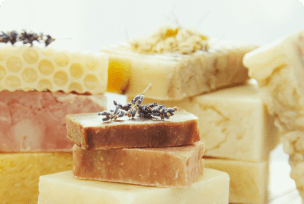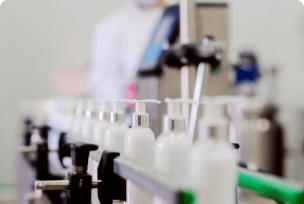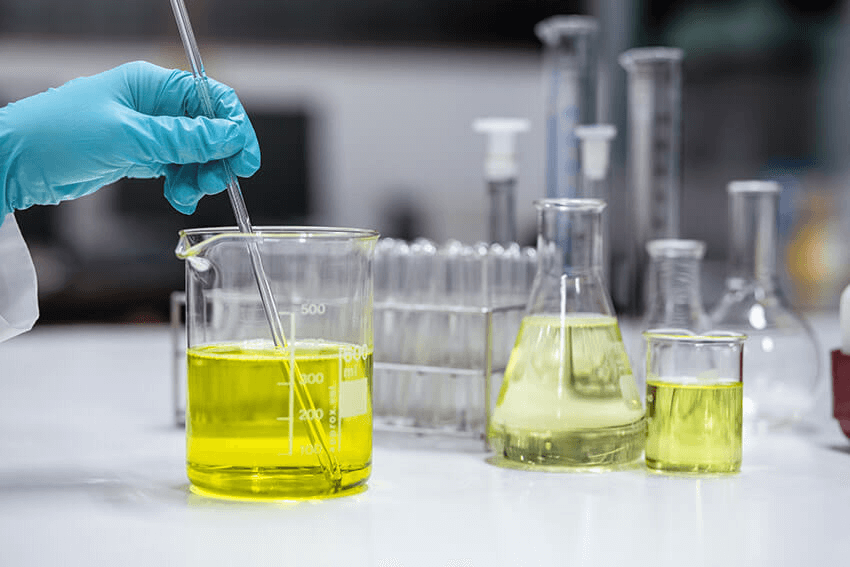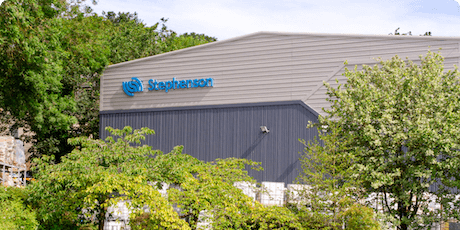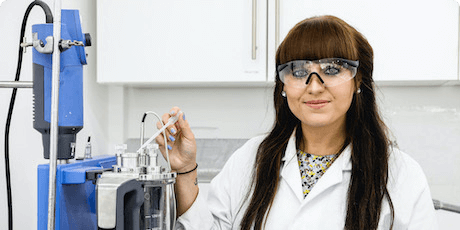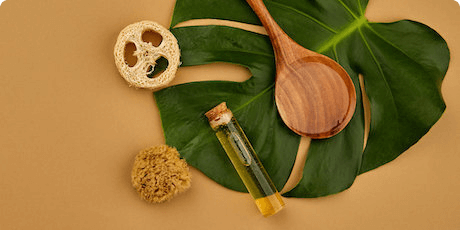Tim uses data and trends from the likes of market-leading brands, manufacturers and research companies to understand where customers should focus on future new product development.
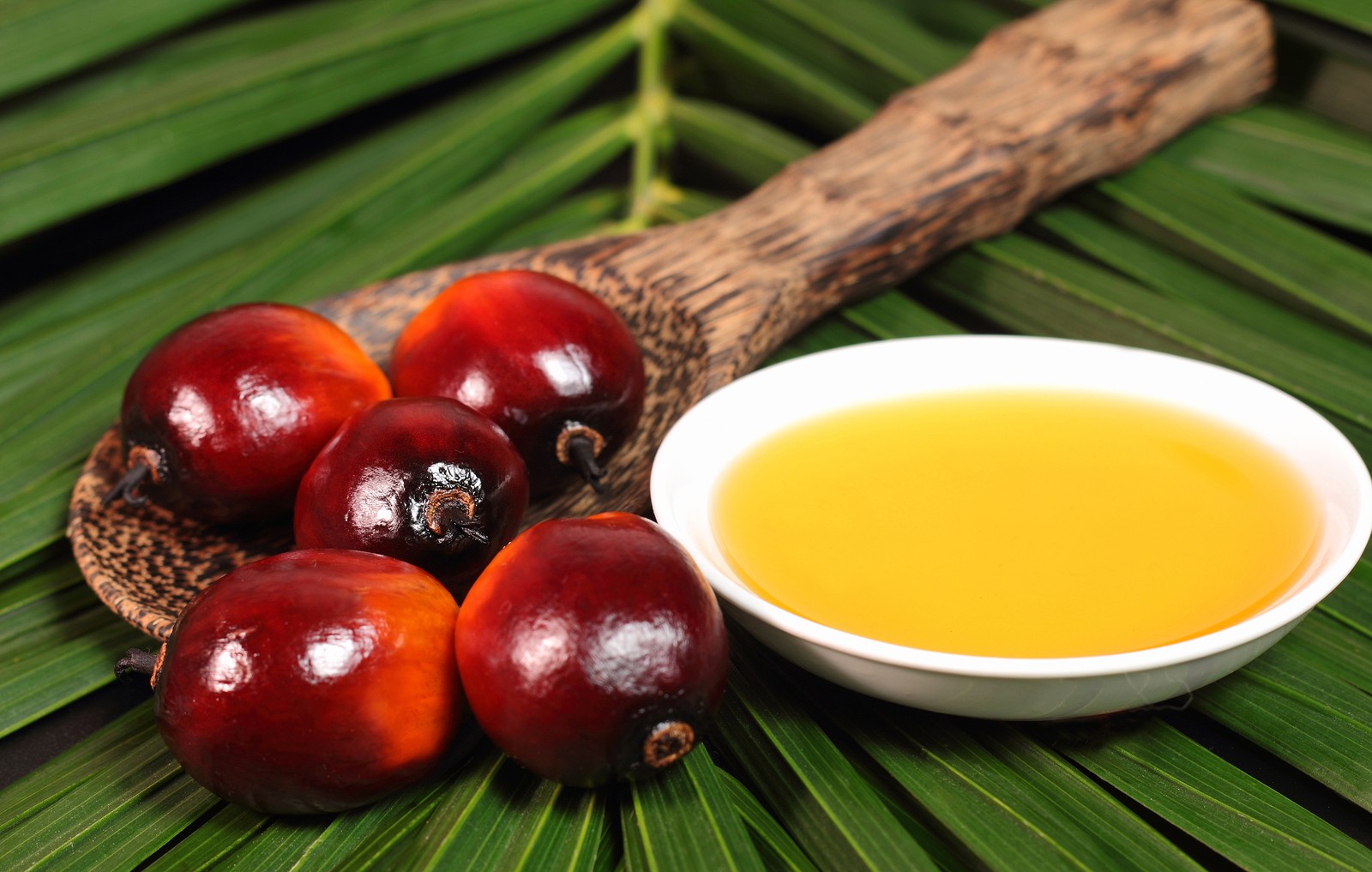
We’re an ethical manufacturer, committed to sustainability in the personal care market. Being a proud member of RSPO and POIG, we want to raise awareness of good palm oil among our customers and consumers to make more informed purchase choices.
It’s a complex and growing environmental issue, we continue to be asked about the Palm Oil in our soap bases, rightly so… Deforestation and illegal clearing are causing devastation to tropical rainforests and ecosystems. Leaders involved in the palm oil industry, from growers to producers to end-use manufacturers, are aware of the challenges they face, yet many remain static whilst options are available.
A few years ago we chose to be different when it comes to sourcing our raw materials, we were the first soap base supplier worldwide to use 100% RSPO certified sustainable Palm and Palm Kernel Oil in our production. This was a step we were proud to make and has seen us progress to develop a wide range of RSPO certified soap products and assist leading brands and retailers achieve their Corporate Social Responsibility (CSR) and RSPO objectives.
Palm oil, found in 70% of food and cosmetic products, have been making headlines in recent years. Often referred to negatively because of links to deforestation and human rights violations, raising public awareness are causing customers to boycott palm oil in general and creating pressure on the retailers. However, boycotting is not a solution, sustainable palm oil is, as switching to alternatives could actually lead to more problems linked with deforestation.

Where palm oil comes from
Palm oil is derived from the Oil Palm Tree, which grows primarily in Indonesia and Malaysia; in addition to Africa and Latin America – although the latter two areas are smaller but rapidly growing with suppliers.
 Image Source: Palm Oil Production Locations
Image Source: Palm Oil Production Locations
Being one of the most widely consumed vegetable oils in the world, palm oil is versatile, easy to process and yields 4 – 10 times more oil per hectare of land than other crops such as sunflower, rapeseed, soybean and coconut.
At present 80% of palm oil in the global supply chain comes from conventional (non-certified) production that is linked with deforestation and breach in workers’ rights etc.
The main sustainable palm oil certifying body, Roundtable on Sustainable Palm Oil (RSPO), supplies 19% of sustainable palm globally and is a largest multi-stakeholder initiative with a vision to transform the markets by making sustainable palm oil the norm. The well-recognised certification body is more and more recognised by consumers through RSPO labels indicating the use of sustainable palm or palm kernel oils in the product.
Building on top of RSPO work, organisations such as Palm Oil Innovation Group (POIG) are continuously working towards ensuring the implementation of the higher standards for sustainable palm oil production through collaboration among NGO’s, leading companies and suppliers.
Thus, palm oil is good as long as it is sustainable palm oil.
"If it’s grown sustainably, palm oil production can benefit local communities, and help to protect valuable species and forests. By using sustainable practices, farmers can increase their income by making more palm oil from less land"
- RSPO
More about RSPO
RSPO stands for the ‘Roundtable on Sustainable Palm Oil’, and it describes itself as “a global, multi-stakeholder initiative on sustainable palm oil” with a vision to “transform the markets by making sustainable palm oil the norm”.
Through RSPO standardised sustainable palm oil supply chain systems, customers can make informed choices about their product purchases. Highest Standards of Sustainable Palm oil production are Identity Preserved and Segregated, while others Mass Balance or Book & Claim are used when the sourcing is not yet available. Thus, customers can make an informed decision about the level of sustainability through an on-product label. These supply chain systems are explained in more detail below.
"Palm oil and its derivatives are used in 70% of cosmetics products, so we feel the work RSPO do is invaluable in educating personal care and cosmetics formulators about the source of the ingredients they put into their products"- Ravi Rathod
Supply Chain Systems: What it means
Palm oil or palm oil derivatives certified by the RSPO can be purchased through four supply chain systems. Each of these systems comes with its own advantages, requirements and pre-approved consumer claims. These four systems ensure that market claims about the production and use of sustainable palm oil remain transparent and accurate.
Image Credit: WWF
1) “Identity Preserved (IP)”:
One supply chain system segregates out certified palm oil from other oil, either as “Identity Preserved” in which the palm oil is kept physically separate from other palm oil throughout the production process.

2) “Segregated”:
Similar to ‘IP’, Segregated means that certified palm oil is kept apart throughout the supply chain; but for a product to be certified ‘Segregated’ it can come from a mixture of several certified sustainable palm oil mills – as opposed to just one source for ‘IP’. It cannot be traced back to its original plantation/mill.

3) "Mass Balance (MB)":
Means that certified palm oil is mixed in with conventional palm oil but monitored administratively so that claimed volumes are matched.

4) "Book & Claim (GreenPalm)":
GreenPalm, a subsidiary company of RSPO founding member and vegetable oil manufacturer AarhusKarlshamn UK Ltd., operates a third supply chain system called “Book and Claim.” In this process, RSPO-certified palm oil producers can register their CSPO palm oil for GreenPalm certificates, which buyers can then purchase through GreenPalm’s online trading system. A step but no real solution.
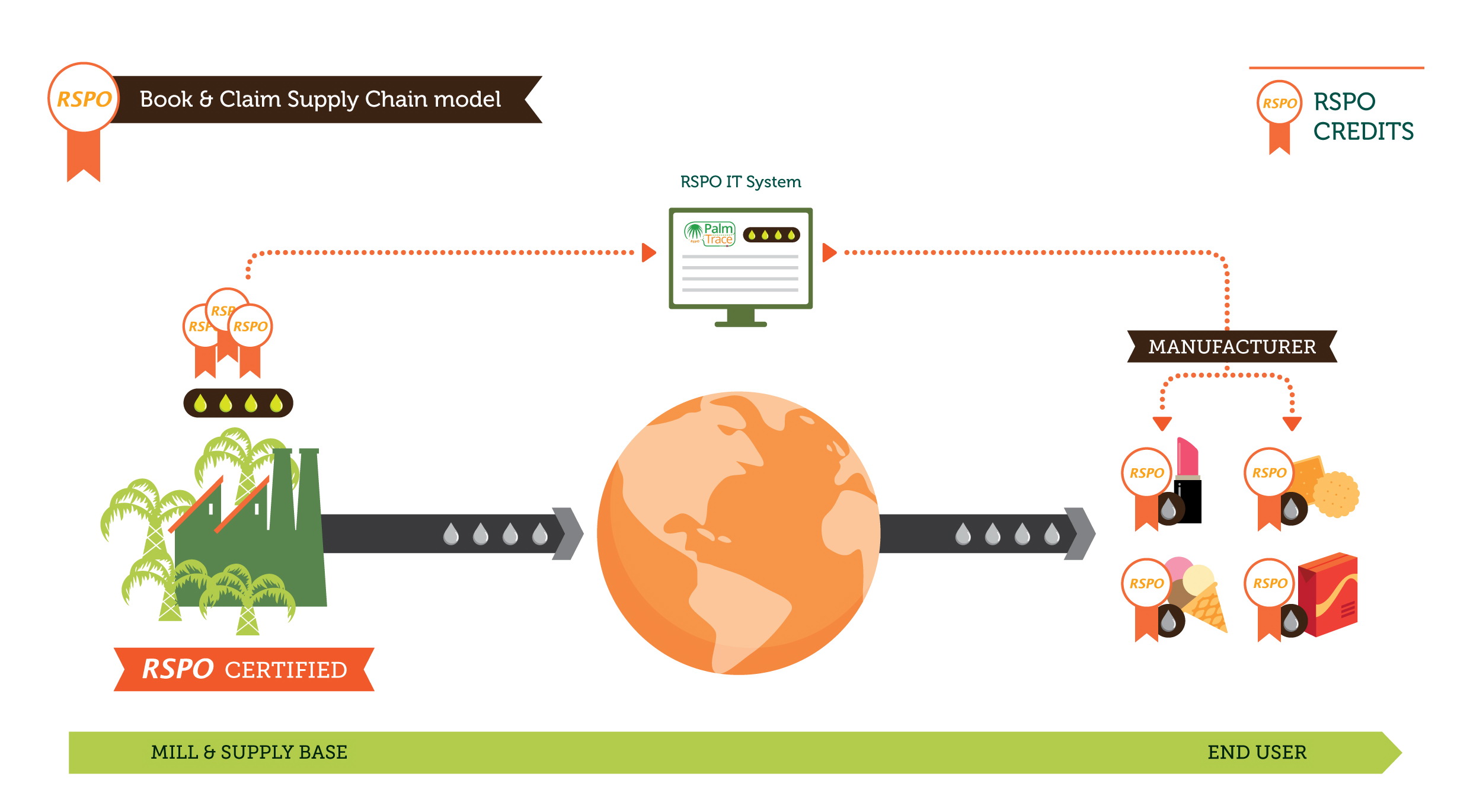
 Image Source: Sustainablepalmoil.org
Image Source: Sustainablepalmoil.org
"Simply look for the RSPO trademark on the things you buy, like food and cosmetics. This is one of the best ways to be sure that you're buying items that are made with palm oil from a certified sustainable palm oil plantation." - Claire Garvey
How this affects 'On Pack' claims
Below, Claire highlights the correct claims that you can make on-pack - subject to compliance with the RSPO rules (Source: “RSPO Webinar on ‘Communications & Claims of RSPO Trademark” Friday 27th May 2016):
- IP/SG Allowed Claims: “Contains Certified Sustainable Palm Oil” (CERTIFIED - optional tag)
- MB Allowed Claims: “Contributes to the production of Certified Sustainable Palm Oil” (MIXED - mandatory tag)
- IP/SG/MB Partial Claims: “The Product contributes to the production of Certified Sustainable Palm Oil” (50% MIXED - mandatory tag)
‘Negative Claims’ such as “Palm Free” are not permitted as part of the Revised RSPO Rules on Market Communications and Claims. A Negative Claim is defined by the RSPO as any claim which “conflicts with the stated aims of the RSPO and/or implies that the removal of palm oil from a product is a preferable social or environmental sustainability outcome to the use of Certified Sustainable Palm Oil”. [Source]
"A decent portion of high street soaps contain raw materials that are unsustainable; however, this certified source will allow soap firms and retailers to make good on their commitment to eradicate unsustainable palm oil from their products." - Claire Garvey
RSPO Certified Products
Processors and traders play an essential role in ensuring the flow and demand of sustainable palm oil through the supply chain to the customer. As a soap base supplier, our products may not carry an actual RSPO / Sustainable trademark. However, we established and have played a key role in developing a traceable segregated supply chain in order to support, promote and allow the RSPO trademark to be used on-pack by our downstream customers worldwide so understanding every aspect of our supply chain is crucial.
Here are some examples of leading brands and retailers making real commitment to change.

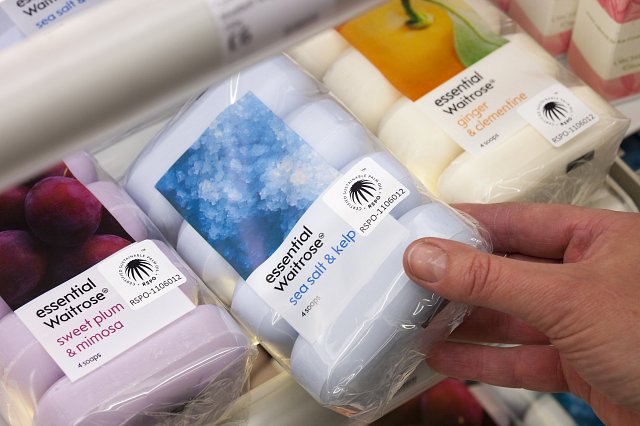 They key behind true supply chain segregation and support is the ‘on-pack’ certification and RSPO icon used, this illustrates the retailers transparency their commitment and the steps taken to ensure full traceability on the supply chain.
They key behind true supply chain segregation and support is the ‘on-pack’ certification and RSPO icon used, this illustrates the retailers transparency their commitment and the steps taken to ensure full traceability on the supply chain.

 It’s great to see a selection of leading brands and retailers staying true to their sustainability commitments. Companies such as Marks & Spencer, Waitrose, Sainsbury’s, The Bodyshop, L’Occitane, The Coop and many more all doing the best they can in a complex and challenging market.
It’s great to see a selection of leading brands and retailers staying true to their sustainability commitments. Companies such as Marks & Spencer, Waitrose, Sainsbury’s, The Bodyshop, L’Occitane, The Coop and many more all doing the best they can in a complex and challenging market.
They key behind true supply chain segregation and support is the ‘on-pack’ certification and RSPO icon used, this illustrates the retailers transparency their commitment and the steps taken to ensure full traceability on the supply chain.
Stephenson offers the first melt and pour, extruded and liquid soap bases made using 100% RSPO Certified Segregated Sustainable Palm Oil and Palm Kernel Oils in soap products.
"In 2013, Stephenson launched the world's first melt and pour soap base using 100% Certified Sustainable Segregated Palm/Palm Kernel Oil. With this, we can be sure that our Palm and Palm Kernel Oil has been farmed sustainably and has not contributed to illegal deforestation or harm to wildlife." - Ravi Rathod
Top 10 Facts About Palm Oil
Watch our animated video below with 10 interesting facts you probably didn’t know about Palm Oil or view our infographic below.
 10 Facts about Palm Oil
10 Facts about Palm Oil
Useful Resources & Videos
We have pulled together a list of useful resources to learn more abut sustainable palm oil:
- For more information about RSPO and the benefits of using ‘good’ sustainable palm oil, visit RSPO website.
- RSPO’s ‘SAY YES TO GOOD PALM OIL’ campaign: RSPO has launched an exciting new campaign, aimed at consumers, which highlights the many products that contain palm oil and the distinction consumers should make between ‘good’ and ‘bad’ palm oil. Read more on goodbadpalmoil.org.
About the Authors: Ravi Rathod & Claire Garvey
Ravi Rathod is a Technical Innovations Chemist at Stephenson Personal Care and joined the business in June 2015. He holds a Masters in Biotechnology from Northumbria University and worked previously for Star Brands as a Senior Development Chemist on a range of retail household cleaning products; at Christeyns UK as a Development Chemist working on a range of industrial cleaning products, and at P&G as a Research Technician.
Claire Garvey is a Technical Innovations Chemist for Stephenson Personal Care. She received a BSc Hons in Molecular and Cellular Biology from the University of Huddersfield. Following graduation, she joined Robert McBride as a Development Chemist, and in 2011 joined Stephenson Personal Care as a Technical Innovations Chemist.












